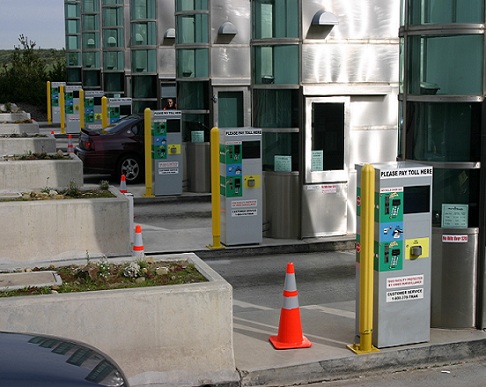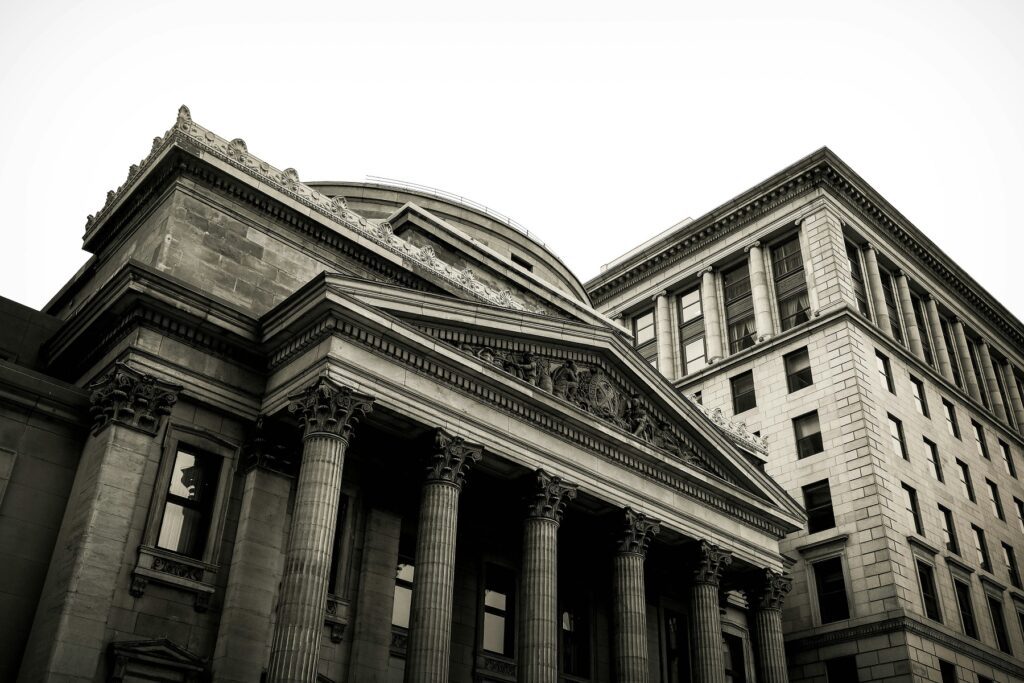Toll roads? In Toronto? Really?
I’ve suggested this several times before in the past, and this Toronto Star article shows that it could be a real possibility for our city…

“Car Commuters Would Pay For Relief: Poll”
Tess Kalinowski
Toronto Star
They’re the stressed-out gladiators in the Toronto region’s daily game of gridlock.
Up to 70 per cent of Toronto area car commuters are prepared to pay user taxes or tolls if it buys them some relief from their daily grind — a commute that two-thirds identified as harmful to their quality of life, according to a study being released Saturday by the Pembina Institute, a Canadian sustainability think-tank with an office in Toronto.
Eighty-five per cent would consider alternative forms of commuting if they had pay-as-you-drive insurance, something that’s not available in Ontario. An overwhelming 94 per cent in a poll of 1,000 drivers said they would like to work from home.
The online research by Environics offers fresh insights into the complexities and sometimes contradictory behaviours of the region’s road warriors.
“There’s a huge interest in the alternatives to the standard five-day commute,” said Pembina’s Cherise Burda, author of the report, Drivers’ Choice: A survey of drivers in the GTA on options to manage gridlock and fund rapid transit in the region.
The study also proves that suburban commuters are prepared to pay for transit improvements that would finance those alternatives, she said.
“We’re looking at up to 58 per cent of drivers supporting a variety of different (tax and toll) tools. The most interesting part is how that goes up to 70 per cent once you say it’s going to be dedicated to building rapid transit,” Burda said.
The policy implications are significant, she said, given that Metrolinx has until June 2013 to produce an investment strategy to raise $40 billion over the next 20 years for the transit improvements cited in its regional transportation plan, The Big Move.
Released in 2008, it recommended a $50 billion regional transit expansion that would ensure that 75 per cent of residents find themselves living within 2 kilometres of a dedicated rapid-transit line, up from what was then 42 per cent.
The Pembina report shows that between 56 and 58 per cent of drivers would support road user fees such as tolls, paid express lanes and parking taxes as long as the charges were dedicated to improving transit.
Slightly fewer — 54 per cent — said they could support a 1 per cent Toronto region sales tax, and 46 per cent supported a 2-cent regional gas tax.
“Our politicians shouldn’t be fearful of implementing some of these choices. They’ve been done elsewhere, where the congestion and traffic issues weren’t as critical as they are in Toronto,” said Burda, citing the example of Los Angeles County. A 2008 referendum there supported a 30-year, 0.5 per cent regional sales tax to raise money for transit and road improvements.
The Pembina research differs from other polls, including one by the Toronto Star last spring. The Star poll found a cross-section of commuters were overwhelmingly opposed to tax and toll schemes to pay for transit. But it also showed that 55 per cent support a congestion charge to drive into the downtown. Of course, downtowners wouldn’t mind a congestion charge — they aren’t going to be paying it, said Burda.
“We went out and asked the toughest element — the drivers living 30 minutes or more away. I was really surprised the numbers were as high as they were for just straight-up willingness to pay,” she said.
The average one-way commute among respondents was 43 minutes. The report debunks the stereotype of drivers as selfish, thoughtless SUV owners brandishing a middle finger at cyclists and streetcars, Burda said.
One-third said they already had access to GO Transit or the subway, but chose to drive anyway, citing the need for work or to run errands and transit inconveniences such as transfers and lengthy commute times.
But 70 per cent said they would consider transit if there was a subway or LRT along their route, and a full 40 per cent said they would be “very interested.”
The online poll, which included descriptions and photos of various forms of rapid transit, found 68 per cent would be somewhat or very likely to use a subway if it were available; 69 per cent would be likely to use an LRT.
It also showed that drivers would get out of their cars for the right financial incentives.
More than 60 per cent indicated they would change their behaviour if they were offered a provincial tax credit worth $150 to $250 annually for alternative commuting expenses, such as gas and parking for carpooling, transit passes or bikes. The federal government currently offers a 15 per cent income tax credit for regular transit riders.
About the same number said they would be somewhat or very likely to leave the car at home if they were offered a cash incentive from their employer equivalent to what the employer would have spent on a parking spot.
WHAT DRIVERS SAID
• Parking: 70% of respondents get free at-work parking; 60% said they would take advantage of a parking cash-out program where an employer would compensate employees for not driving to work.
• Paying to save time: 55% said they would pay $2 to shave their commute time by one-third; only 30% cent said they would pay $8 to save that much time
• Toll lanes: About 70% said they would pay $2 to use an express lane; only about 30% would pay $10 to use such a lane
• Road warriors: 70% of the drivers surveyed took the car five days a week and two-thirds said their commute was stressful
• Their route and ride: 84% use a major highway; 56% don’t have access to rapid transit
I was in New York City last weekend, and I was amazed by the amount of toll roads coming into the downtown core.
Amazed, and envious.
I’ve always thought that Toronto should install toll roads to tax the residents of Oakville, Burlington, St. Catharines, and the like – who drive into Toronto every day to take jobs away from those who live in Toronto AND pay property taxes in Toronto.
I think this would help bring in much-needed tax revenue, and it would get more people off the already-crowded roads.
I know people will disagree, and that’s their right.
I don’t want to sound like a redneck American from the deep south saying, “Mexicans are stealing our jobs!” Please don’t misconstrue my statement above about “taking away jobs” from Torontonians. I’m just saying that if people who pay property taxes in areas other than Toronto are working in Toronto, and driving on Toronto roads, then they’re getting off light.
One of the comments on the Toronto Star website said something about those in favour of toll roads and other driving fees “having more money than brains.”
Again, I disagree. I think these people just have money, and the sentence should end there.
Would I pay $10, $20, or $100 per month if it meant there were fewer cars on the roads? Sure I would! I drive my car all around the city, likely two hours per day, and I would easily pay a user fee or a toll if it meant the presence of one put fewer people behind the wheel.
At the risk of turning this topic into a debate about Rob Ford and subways versus Karen Stintz and LRT, I do think that something needs to be done about public transit in this city, and the quarrelling at City Hall has to stop.
If we’re going to wait another 2-3 years to get this thing sorted out, I’d almost accept the LRT right now. Almost…
I had this discussion with a client of mine today and he said, “Fifty years from now, imagine what the city will look like with all the LRT congestion? The future of the city depends on the decision made today.”
He’s right. I was almost willing to say, “Okay, fine, give us LRT if it means we start today, and not five years from now.” But that’s just being impatient on my part. I truly believe that subways are the way to go, and as eager as I am to see anything done, I think we should keep a long-term outlook.
The city has too many cars on the roads, and not enough public transit.
These are two different problems, but they’ll always be intertwined.
And as my client astutely pointed out today, “Municipal politics is a mess in Toronto; you elect a mayor, but he’s powerless when he has one vote against all these other city councillors. What good is a mayor anyways?”
What good, indeed…































BillyO
at 8:10 am
I wholeheartedly endorse tolls if and only if it results in construction of the downtown relief line, with the appropriate north/south connection alignment (a Queen line from Keele to Pape is not enough) which will give TO a very respectable transit system along with the great news that we can have all 4 LRT lines by 2020. Oh, and let’s get some all day GO service going too, please and thank you. If so, bring on the tolls!
Vincent
at 9:36 am
Don’t the municipalities right now transfer some money to the city of Toronto anyways in the form of their citizens going to Toronto and using their roads etc to subsidize the costs?
Hence why Toronto property tax is lower than more surrounding cities?
So don’t people around the GTA already get “taxed” to go to Toronto?
Joe Q.
at 10:09 am
Residential property tax rates in Toronto are lower than surrounding cities, but commercial property tax rates here are significantly higher.
There is a table at http://www.sellhomestoronto.com/updatenews4.htm
J
at 12:11 pm
Does the City get money from provincial and federal gas taxes for road maintenance on city streets including the Gardiner and DVP? If so, then a toll on drivers from outside the City of Toronto would be ridiculous.
There are multiple better solutions
1) Toll everyone (City of Toronto residents can get a discount, but still should pay a “user-fee”)
2) More effective lobbying for gas tax proceeds by the city of Toronto. The DVP and Gardiner are major through-ways for people traveling across southern Ontario
3) Increase property taxes/special levy: If the proceeds are going to fund public transit, everyone should be taking a hit, not just out of town commuters
4) Congestion charge: Stay out of downtown by car. There are plenty of options for Torontonians and non-Torontonians to get downtown.
5) The 3-letters that would solve a lot of public transit issues: PPP
Chris
at 12:45 pm
I think you are being a little bit too anti-LRT. Even if you had enough money to fund the subways, it still makes more sense to build LRTs where demand warrants it to expand the transit network, and then ALSO add in subways where demand warrants it. So, the planned LRTs on Sheppard, Finch, and Eglinton should stay in place, they are reasonably justified plans. But then also, taxes should be used to build a downtown relief line, so subways are built to go where people actually want to go. How many people even use the Sheppard line now to go to Sheppard and Yonge? Almost all of them probably transfer at Yonge and go downtown on the crowded Yonge line. Far better, I would think, would be for them to be able to take an LRT line all the way along Sheppard, get to Don Mills, then transfer there to a less crowded downtown relief line. (I know the first phase of a downtown relief line would not go this far). I think this would be far more popular than a wasteful subway line on Sheppard when all it does is overfeed the Yonge line.
Maggie K.
at 5:09 pm
I don’t understand commuting. Work wear you live, live where you work.
Maggie K.
at 5:11 pm
*where